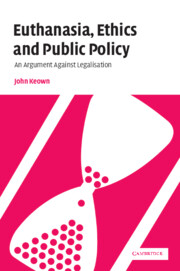Book contents
- Frontmatter
- Contents
- Preface
- Foreword
- Acknowledgments
- Table of cases
- List of abbreviations
- Introduction
- PART I Definitions
- PART II The ethical debate: human life, autonomy, legal hypocrisy, and the slippery slope
- PART III The Dutch experience: controlling VAE? condoning NVAE?
- PART IV Australia and the United States
- PART V Expert opinion
- 16 Expert committees
- 17 Supreme Courts
- 18 Medical associations
- PART VI Passive euthanasia: withholding/withdrawing treatment and tube-feeding with intent to kill
- Conclusions
- Afterword
- Bibliography
- Index
17 - Supreme Courts
Published online by Cambridge University Press: 20 July 2009
- Frontmatter
- Contents
- Preface
- Foreword
- Acknowledgments
- Table of cases
- List of abbreviations
- Introduction
- PART I Definitions
- PART II The ethical debate: human life, autonomy, legal hypocrisy, and the slippery slope
- PART III The Dutch experience: controlling VAE? condoning NVAE?
- PART IV Australia and the United States
- PART V Expert opinion
- 16 Expert committees
- 17 Supreme Courts
- 18 Medical associations
- PART VI Passive euthanasia: withholding/withdrawing treatment and tube-feeding with intent to kill
- Conclusions
- Afterword
- Bibliography
- Index
Summary
The Law Lords
As we saw while reviewing the Dutch experience, the courts in at least one jurisdiction have changed the law to permit VAE and PAS. However, such judicial law-making is rare. In many countries judges would regard any relaxation of the prohibition as a matter properly to be left to elected legislatures, not only because the criminal prohibition is so long-established, but also because repeal is thought to involve profound issues of principle and complex issues of social policy better suited to legislative than judicial determination.
The English courts provide a good illustration of judicial reluctance to relax the law to permit doctors to administer or hand lethal injections to patients. The courts undoubtedly have the power to do so for, as an eminent judge once wrote, the law is what the judges say it is. It would, for example, be possible for the English courts to follow their Dutch counterparts and extend the defence of necessity. It is, however, unlikely that they would do so, not least because the defence of necessity in English law has traditionally been used to justify the conduct of those who save life, not take it. In the Bland case, Lord Goff, having noted that ‘euthanasia’ (by which he clearly meant active medical killing) was illegal at common law, observed:
It is of course well known that there are many responsible members of our society who believe that euthanasia should be made lawful; but that result could, I believe, only be achieved by legislation which expresses the democratic will that so fundamental a change should be made in our law, and can, if enacted, ensure that such legalised killing can only be carried out subject to appropriate supervision and control.
- Type
- Chapter
- Information
- Euthanasia, Ethics and Public PolicyAn Argument Against Legalisation, pp. 191 - 207Publisher: Cambridge University PressPrint publication year: 2002



